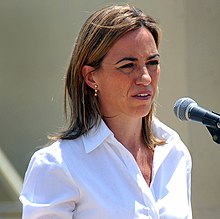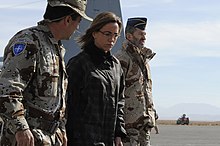In this Spanish name, the first or paternal surname is Chacón and the second or maternal family name is Piqueras.
| Carme Chacón | |
|---|---|
 | |
| Minister of Defence | |
| In office April 14, 2008 – May 20, 2008 | |
| Prime Minister | José Luis Rodríguez Zapatero |
| Preceded by | José Antonio Alonso |
| Succeeded by | Alfredo Pérez Rubalcaba (interim) |
| In office June 30, 2008 – December 22, 2011 | |
| Prime Minister | José Luis Rodríguez Zapatero |
| Preceded by | Alfredo Pérez Rubalcaba (interim) |
| Succeeded by | Pedro Morenés |
| Minister of Housing | |
| In office July 9, 2007 – April 11, 2008 | |
| Prime Minister | José Luis Rodríguez Zapatero |
| Preceded by | María Antonia Trujillo |
| Succeeded by | Beatriz Corredor |
| Member of the Congress of Deputies | |
| In office January 13, 2016 – July 19, 2016 | |
| Constituency | Barcelona |
| In office March 13, 2000 – August 31, 2013 | |
| Constituency | Barcelona |
| Personal details | |
| Born | Carme Chacón Piqueras (1971-03-13)March 13, 1971 Esplugues de Llobregat, Spain |
| Died | April 9, 2017(2017-04-09) (aged 46) Madrid, Spain |
| Political party | PSOE (PSC) |
| Spouse | Miguel Barroso (2007–2016) |
| Alma mater | University of Barcelona University of Kingston York University Laval University |
| Occupation | Lawyer Professor |
Carme Maria Chacón Piqueras (Catalan pronunciation: [ˈkaɾmə tʃəˈkom piˈkeɾəs]; March 13, 1971 – April 9, 2017) was a Spanish lawyer, lecturer and politician who was minister of Defence from 2008 to 2011 in the cabinet led by Spanish Prime Minister José Luis Rodríguez Zapatero.
A member of the Spanish Socialist Workers Party (PSOE) from 1994, she was elected member of the Parliament of Catalonia and vice president of the Spanish Congress of Deputies, the lower house in the Spanish Parliament. In 2007, she entered the cabinet led by Spanish Prime Minister José Luís Rodríguez Zapatero as minister of Housing. A year later, she became the first woman to take charge of the Spanish Ministry of Defense.
Early life and education
Chacón was born in Esplugues de Llobregat in Catalonia, in the region of Baix Llobregat. She held a bachelor's degree in law from the University of Barcelona, and conducted her postgraduate studies at Osgoode Hall Law School, Kingston University and Laval University. Besides this, she worked as a lecturer of constitutional law at the University of Girona between 1994 and 2004.
Political career
Chacón was a member of the Socialists' Party of Catalonia (PSC) and Spanish Socialist Workers' Party (PSOE) since 1994. She was first elected as a PSOE member of parliament for Barcelona in the 2000 election. In the same year, she became vice-president of the Spanish Congress of Deputies (Lower House) in José Luis Rodríguez Zapatero's legislature and she was later named minister of Housing after María Antonia Trujillo, before becoming minister of Defence in April 2008.
Member of Parliament
Her parliamentary career started after the general elections of 2000 when she won a seat for the province of Barcelona and went on to be elected as such in different legislations.
Minister of Housing
Whilst José Luis Rodríguez Zapatero's term, Carme replaced María Antonia Trujillo as minister of Housing. When already in charge, she had to face the Spanish real estate bubble.
Minister of Defence

April 14, 2008, Chacón was named minister of Defence. She became the first female minister of Defence in Spain, which, together with the fact that she was seven months pregnant at the time, was considered a significant development by the press. Interior Minister Alfredo Pérez Rubalcaba temporarily took over the defense portfolio when Chacón gave birth. Shortly after she chose to live in the Ministry's residence, which has its own kindergarten, so as not to waste time travelling between her home and her workplace. That year surveys results points to her as the most influential minister of Mr Zapatero's cabinet.
In 2009, Carme announced the controversial withdrawal of Spanish troops set in Kosovo due to its unrecognizable independence proclamation for the country. Despite the strong opposition of the US government, the Spanish cabinet agreed with the NATO allies the gradual withdrawal of these troops.
In the same year, with the growth of piracy in Somali waters, Carme had to deal with the capture of Alakrana, a Basque trawler. A year after, she justified the delivery of new troops to Afghanistan as she proclaimed there was light at the end of the tunnel. Months later, she travelled to Haiti to decorate dead Spanish soldiers on a helicopter crash and visit those deployed due to an earthquake.

At the NATO summit in Lisbon in 2010, she informed that the Spanish Armed Forces would start the transference of two Afghan provinces under their control in 2011, three years before the established date by the Alliance for the retreat of the troops. As a minister, the country's Emergency State of the democracy was decreed for the air traffic controllers' crisis in 2010. She also chaired the meetings of the EU defence ministers while Spain held the European Union's six-month rotating presidency. During this time, she led the negotiations with EADS about €3.5 billion ($4.7 billion) extra funding for the Airbus A400M Atlas military transport.
In 2011, the Congreso de los Diputados, the lower house in the Spanish Parliament, adopted a law for the rights and duties of the soldiers (also known as Chacon law). This law allows the soldiers to have an associative activity and creates a committee or Junta de Personal acting as a link between the Ministry and the troops.
38th Federal Congress of PSOE
After Zapatero announced he was not going to run in the 2012 elections, Chacón was expected to run for her party's leadership during autumn 2011. However, after the failure of the PSOE in 2011 local elections, she announced that she was withdrawing from the race. The general election was held early in November 2011, in which Zapatero's government was defeated by the People's Party. She left her post and was replaced by new defence minister, Pedro Morenés.
In January 2012 she announced her intention to opt for the general secretary of PSOE. According to Chacón, her goal was to "lead a new project" and "raise" the party. However, during the celebration of the 38th Federal Congress of PSOE, Chacón lost against Alfredo Pérez Rubalcaba 487 to 465 votes.
PSOE's Secretary for International Relations
Since PSOE's Extraordinary Congress, celebrated in July 2014, Chacón handled the Socialist party's international relations. When Rubalcaba later announced his resignation after his party's dismal showing in the 2014 European elections, Chacón was widely seen as one of the frontrunners for his replacement, but did not run. She left politics in 2016 to practice law. She was also a member of the European Council on Foreign Relations.
Personal life
From 2007 to 2016 she was married to Miguel Barroso Ayats, a Spanish journalist, father of her son, also named Miguel.
Chacón was found dead at her home on April 9, 2017, aged 46, due to a congenital heart defect. Chacón suffered from dextrocardia and an atrioventricular block.
See also
References
- "Ministra de Defensa: Carme Chacón Piqueras" (in Spanish). Government of Spain. Archived from the original on December 17, 2011. Retrieved April 12, 2017.
- ^ "Carme Chacón, Spain's first female defence minister, dies". The Guardian. Associated Press. April 10, 2017. Retrieved April 11, 2017.
- Abend, Lisa (April 15, 2008). "Spain's Pregnant Defense Minister". Time. Archived from the original on April 15, 2008. Retrieved November 28, 2012.
- Sarah Morris (February 16, 2012). "Women's work". The Guardian. Retrieved November 28, 2012.
- Victoria Burnett (May 21, 2008), "Spain's Defense Minister Becomes a Mother". The New York Times.
- Helene Zuber (April 15, 2010), "Charming Carme: Spain's Defense Minister Makes Her Mark in a Macho World". Der Spiegel.
- Gerrit Wiesmann (February 25, 2010), "Deal in principle struck on A400M". Financial Times.
- "Chacón: 'Me retiro porque se ha puesto en riesgo al PSOE y al Gobierno'". El País. May 26, 2011. Retrieved November 28, 2012.
- "Spain's new Minister of Defence Pedro Mo". Getty Images. Retrieved April 11, 2017.
- "Política . Comunitat : Alfredo Pérez Rubalcaba gana a Carme Chacón por 22 votos de diferencia". El periódico de aquí. Archived from the original on July 14, 2014. Retrieved November 28, 2012.
- Tobias Buck (May 26, 2014), "Spain's opposition Socialist leader Alfredo Pérez Rubalcaba quits". Financial Times.
- "Remembering Carme Chacón". ECFR. April 10, 2017. Retrieved April 12, 2017.
- Villar, Cote (July 23, 2016). "Carme Chacón se divorcia de Miguel Barroso tras nueve años casados". EL MUNDO (in Spanish). Retrieved April 12, 2017.
- "Tengo 35 pulsaciones por minuto, el corazón al revés, un bloqueo auricular y ventricular completo". December 12, 2015.
External links
| Political offices | ||
|---|---|---|
| Preceded byMargarita Mariscal de Gante | Vice-President of the Congress of Deputies 2004–2007 |
Succeeded byCarmen Calvo |
| Preceded byMaría Antonia Trujillo | Minister of Housing 2007–2008 |
Succeeded byBeatriz Corredor |
| Preceded byJosé Antonio Alonso | Minister of Defence 2008–2011 |
Succeeded byPedro Morenés |
- 1971 births
- 2017 deaths
- Politicians from Catalonia
- Women politicians from Catalonia
- Members of the 7th Congress of Deputies (Spain)
- Members of the 8th Congress of Deputies (Spain)
- Members of the 9th Congress of Deputies (Spain)
- Female defence ministers
- Women government ministers of Spain
- Ministers of defence of Spain
- Housing ministers of Spain
- York University alumni
- Université Laval alumni
- People from Esplugues de Llobregat
- 20th-century Spanish women politicians
- 21st-century Spanish women politicians